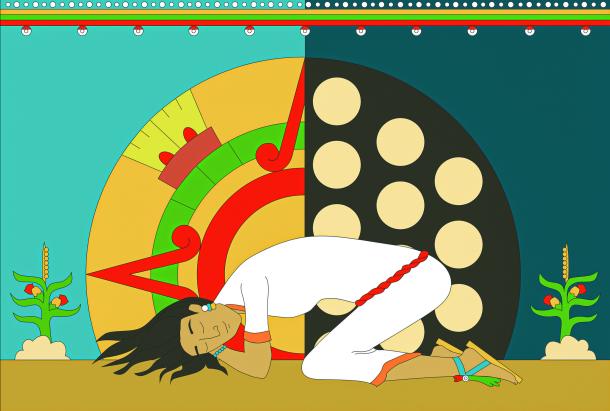Article
In Mexico, drawings to translate words

Daliri Oropeza
Journalist based in Mexico
In January 2022, employees of a hotel in Tulum, a tourist resort on the Yucatan Peninsula, demonstrated in the streets of the town. Their demands? To obtain the recognition of their social rights and to protest the rule forbidding them to speak their language, Maya.
The event is not insignificant. With its sixty-eight indigenous languages, Mexico is one of the world’s most linguistically diverse nations. But this rich diversity is eroding. It is partly because indigenous languages exist in many variants, meaning that speakers of the same language do not necessarily understand each other. The main reason for the decline, however, is the predominance of Spanish, which is used for all official, literary and educational purposes.
With its sixty-eight indigenous languages, Mexico is one of the world’s most linguistically diverse nations
The work carried out through the book Intraducibles (Untranslatables) by Irma Pineda – a Didxazá-speaking Zapotec poet and representative of indigenous peoples to the United Nations – is situated in this context. Published in 2021, the book collects and illustrates sixty-eight words from thirty-three languages of Mexico’s indigenous peoples that do not have a Spanish translation. Each word has a corresponding illustration that sheds light on its untranslatable nature.
Digging into the collective memory
“Intraducibles was born of a conversation I had with Gabriela Lavalle, director of the Mexican Cultural and Tourism Institute of Houston in the United States, about the book Lost in translation by Ella France Sanders, which lists untranslatable words in many languages”, says Pineda. “In indigenous languages, there are also words that have to do with emotions, sensations and traditions, which are very difficult to capture in a single word in Spanish.”
For example, the term ndúyuu, which in the Zapotec language refers to a body position one adopts to rest. In the book, it is illustrated by people in the fetal position. Other examples are chuchumi, which means “to stare into the void” in Akateko; ke ndse', a ritual dedicated to the Earth that consists of placing stones in the river to ensure the health of a newborn child in Chatino; or watsapu, which refers to a special sheet used to wrap black bean tamales in Tutunakú.
The book, which was produced with the support of the National Institute of Indigenous Languages of Mexico, the Santillana publishing house and the UNESCO National Office in Mexico, was an opportunity to dig into the collective memory of the speakers. They were invited to investigate their own language to find words that had no equivalent in Spanish.
The idea is for these words, exhumed by elders, to find a place in everyday life. “The fact that people see their language, their words, reflected in a book, in written and illustrated form, gives meaning to and embellishes them. People reconnect with a word and regain the affection they have for their language," says Pineda.
Words from the heart
Young people have a key role to play in the revaluation and use of these languages. Some have already grasped this. For Érika Hernández, a young Nahua painter from the state of Morelos in central Mexico, Nahuatl is a language that carries a non-exclusive vision of the world, and does not differentiate between the sexes. “The feeling is different when I use certain words to describe nature or an emotion”, she explains. “It's something very personal that comes from the heart and risks losing its meaning if you translate it.”
Young people have a key role to play in the revaluation of indigenous languages
Intraducibles succeeds in making tangible and reflecting the depth and meaning of several words, thus offering a more profound understanding of indigenous culture, from cuisine to ritual practices. By reading these words, we learn more about the ideas behind our food, our celebrations and our beliefs.
Many schools, especially in indigenous villages, have already ordered the book. Despite this success, Pineda regrets not having been able to find words in all sixty-eight of the existing languages. “Some languages have suffered a lot”, explains the poet, who deplores the contempt in which indigenous languages are still held and the lack of knowledge that surrounds them. "But we cannot appreciate what we do not know", she concludes.











